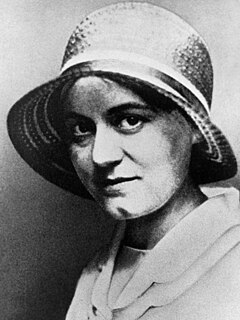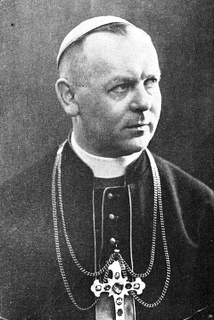
Maximilian Kaller was Roman Catholic Bishop of Ermland in East Prussia from 1930–1947, however, de facto expelled since mid-August 1945 he served as special bishop for the homeland-expellees until his death.

August Hlond was a Polish cardinal of the Roman Catholic Church, who was Archbishop of Poznań and Gniezno in 1926 and Primate of Poland. He was then appointed as the Archbishop of Gniezno and Warsaw in 1946.

Arthur Karl Greiser was a Nazi German politician, SS-Obergruppenführer and Reichsstatthalter of the German-occupied territory of Wartheland. He was one of the persons primarily responsible for organizing the Holocaust in occupied Poland and numerous other crimes against humanity. Arrested by the Americans in 1945, he was tried, convicted and executed by hanging in Poland in 1946.

Catholic clergy involvement with the Ustaše covers the role

Prince Adam Stefan Stanisław Bonifacy Józef Sapieha was a Polish cardinal of the Roman Catholic Church who served as Archbishop of Kraków. Between 1922–1923 he was a senator of the Second Polish Republic. In 1946, Pope Pius XII created him Cardinal.

Adolf Cardinal Bertram was archbishop of Breslau and a cardinal of the Roman Catholic Church.
Persecutions against the Catholic Church took place throughout the pontificate of Pope Pius XII (1939-1958). Pius' reign coincided with the Second World War, the commencement of the Cold War and the accelerating European decolonisation. During this time, the Catholic Church faced persecution under Fascist and Communist governments.
Pope Pius XII and Poland includes Church relations from 1939–1958. Pius XII became Pope on the eve of the Second World War. The invasion of predominantly Catholic Poland by Nazi Germany in 1939 ignited the conflict and was followed soon after by a Soviet invasion of the Eastern half of Poland, in accordance with an agreement reached between the dictators Joseph Stalin and Adolf Hitler. The Catholic Church in Poland was about to face decades of repression, both at Nazi and Communist hands. The Nazi persecution of the Catholic Church in Poland was followed by a Stalinist repression which was particularly intense through the years 1946–1956. Pope Pius XII's policies consisted in attempts to avoid World War II, extensive diplomatic activity on behalf of Poland and encouragement to the persecuted clergy and faithful.

Carl Maria Splett was a German Roman Catholic priest and Bishop of Danzig (Gdańsk); his role during World War II, especially as apostolic administrator of the Diocese of Culm, is controversial. After World War II he was put on trial and imprisoned in Poland for his alleged collaboration with Nazi regime, and later deported to West Germany.

Cesare Vincenzo Orsenigo was Apostolic Nuncio to Germany from 1930 to 1945, during the rise of Nazi Germany and World War II. Along with the German ambassador to the Vatican, Diego von Bergen and later Ernst von Weizsäcker, Orsenigo was the direct diplomatic link between Pope Pius XI and Pope Pius XII and the Nazi regime, meeting several times with Adolf Hitler directly and frequently with other high-ranking officials and diplomats.

The reorganization of occupied dioceses during World War II was an issue faced by Pope Pius XII of whether to extend the apostolic authority of Catholic bishops from Nazi Germany and Fascist Italy to German-occupied Europe during World War II.
Pope Pius XII's 1942 Christmas address was a speech delivered by Pope Pius XII over Vatican Radio on Christmas 1942. It is notable for its denunciation of the extermination of people on the basis of race, and followed the commencement of the Nazi Final Solution program to exterminate the Jews of Europe. The significance of the denunciation is a matter of scholarly debate.

Catholic bishops in Nazi Germany differed in their responses to the rise of Nazi Germany, World War II, and the Holocaust during the years 1933–1945. In the 1930s, the Episcopate of the Catholic Church of Germany comprised 6 Archbishops and 19 bishops while German Catholics comprised around one third of the population of Germany served by 20,000 priests. In the lead up to the 1933 Nazi takeover, German Catholic leaders were outspoken in their criticism of Nazism. Following the Nazi takeover, the Catholic Church sought an accord with the Government, was pressured to conform, and faced persecution. The regime had flagrant disregard for the Reich concordat with the Holy See, and the episcopate had various disagreements with the Nazi government, but it never declared an official sanction of the various attempts to overthrow the Hitler regime. Ian Kershaw wrote that the churches "engaged in a bitter war of attrition with the regime, receiving the demonstrative backing of millions of churchgoers. Applause for Church leaders whenever they appeared in public, swollen attendances at events such as Corpus Christi Day processions, and packed church services were outward signs of the struggle of ... especially of the Catholic Church - against Nazi oppression". While the Church ultimately failed to protect its youth organisations and schools, it did have some successes in mobilizing public opinion to alter government policies.
Filippo Cortesi was the Apostolic Nuncio to Poland from December 24, 1936 to February 1, 1947. Cortesi earlier served as nuncio to Paraguay in the interim. Cortesi was the only nuncio to Poland never to become a cardinal.

Dr. Kazimierz Papée was the ambassador from Poland to the Holy See from 1939 to 1958, during and after World War II. Due to the Nazi invasion of Poland months after Papée's appointment, Papée represented the Polish government-in-exile for the remainder of Pope Pius XII's papacy, before being dismissed by his successor, Pope John XXIII.

The Expulsion of Poles by Nazi Germany during World War II was a massive Nazi German operation consisting of the forced resettlement of over 1.7 million Poles from all territories of occupied Poland with the aim of their geopolitical Germanization between 1939–1944. The expulsions were justified by Nazi racial theory, which depicted Poles and other Slavs as racially inferior Untermenschen.

The Catholic Church in Poland was brutally suppressed by the Nazis during the German Occupation of Poland (1939-1945). Repression of the Church was at its most severe in Polish areas annexed by Nazi Germany, where churches were systematically closed and most priests were either killed, imprisoned, or deported. From across Poland, thousands of priests died in prisons and concentration camps; thousands of churches and monasteries were confiscated, closed or destroyed; and priceless works of religious art and sacred objects were lost forever. Church leaders were targeted as part of an overall effort to destroy Polish culture. At least 1811 Polish clergy died in Nazi concentration camps. An estimated 3000 clergy were killed in all. Hitler's plans for the Germanization of the East saw no place for the Christian Churches.

Several Catholic countries and populations fell under Nazi domination during the period of the Second World War (1939–1945), and ordinary Catholics fought on both sides of the conflict. Despite efforts to protect its rights within Germany under a 1933 Reichskonkordat treaty, the Church in Germany had faced persecution in the years since Adolf Hitler had seized power, and Pope Pius XI accused the Nazi government of sowing 'fundamental hostility to Christ and his Church'. Pius XII became Pope on the eve of war and lobbied world leaders to prevent the outbreak of conflict. His first encyclical, Summi Pontificatus, called the invasion of Poland an "hour of darkness". He affirmed the policy of Vatican neutrality, but maintained links to the German Resistance. Despite being the only world leader to publicly and specifically denounce Nazi crimes against Jews in his 1942 Christmas Address, controversy surrounding his apparent reluctance to speak frequently and in even more explicit terms about Nazi crimes continues. He used diplomacy to aid war victims, lobbied for peace, shared intelligence with the Allies, and employed Vatican Radio and other media to speak out against atrocities like race murders. In Mystici corporis Christi (1943) he denounced the murder of the handicapped. A denunciation from German bishops of the murder of the "innocent and defenceless", including "people of a foreign race or descent", followed.
























